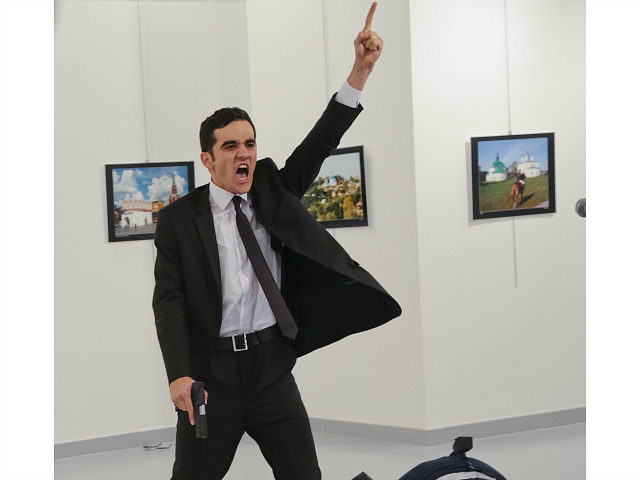Turkish police have told reporters that Mevlüt Mert Altıntaş, the police officer responsible for the assassination of Russian Ambassador to Turkey Andrey Karlov, had in his possession materials linking him to both al-Qaeda and the U.S.-based Islamic cleric Fethullah Gulen.
The Turkish newspaper Hurriyet reports that police have raided Altıntaş’s home in Turkey looking for any indication of his motives for killing the ambassador, particularly if he was convinced to engage in the act by any terrorist organizations. According to Hurriyet, “police have found books related to the Fethullahist Terrorist Organization (FETÖ) and al-Qaeda in a search at Altıntaş’s house in the Keçiören district of Ankara.”
Police have arrested at least seven people in relation to the assassination, most members of the Altıntaş family, including his mother, father, sister, and uncle. His immediate family was living in their native Söke district, Aydın. The state-run Anadolu Agency reported Tuesday that Altıntaş’s roommate in Ankara was also among those arrested given the alleged presence of extremist propaganda in their apartment.
The agency adds that Altıntaş’s uncle, identified as Hasan F., is of particular interest to police because he was once “a former senior executive at a Fetullah Terrorist Organization (FETO)-linked private school shut down in an investigation following the July 15 defeated coup.”
An unnamed senior Turkish official told the Associated Press that Altıntaş was “unlikely to have acted alone,” reiterating initial reports that the Turkish government suspects Gulen’s hand in the operation. The official also described the assassination as “fully professional, not a one-man action.”
Altıntaş opened fire on Karlov while the latter was giving a speech at an art exhibition late Monday local time. The shooter shouted, “Allahu akbar,” called the killing “revenge for Aleppo,” and used a hand gesture typically associated with jihadists, making his motives for shooting Karlov clear. Police are now still attempting to understand how Altıntaş arrived at the conclusion that such a killing was necessary — whether he planned it on his own or acted at the behest of a terrorist organization. No such organization has taken credit for the attack at press time.
The Turkish government has already implicated Gulen, who lives in self-imposed exile in Pennsylvania and runs a chain of Islamic charter schools in America.
“With the normalization of Turkish-Russian relations, we can see that this was a direct attack on the peace process which started especially in Syria and the steps taken to improve the situation there,” Deputy PM Numan Kurtulmus said Tuesday, calling the attack a “clear and open provocation” that represented the latest salvo in an attack on the Turkish government “since July.”
Gulen has denied involvement with the assassination and with the July 15 failed coup, which Turkish President Recep Tayyip Erdogan blamed exclusively on him. Altıntaş, meanwhile, had been previously suspended following the coup for having potential links to Gulen, along with tens of thousands of government employees in Turkey. He was ultimately reinstated as an officer, however, using his police identification to enter the art exhibition armed.
While high-ranking Russian officials have yet to speculate, some in the nation’s legislature have implied that NATO may have sent Altıntaş. The Russian government has officially instead focused on Karlov’s legacy and suggested that his involvement in Syria triggered the attack. “He was so devoted to the cause of peace, truly understanding what was happening and how terrorists form, and that the more they spread their ideas in this region the more difficult it is to establish a political process,” Russian Foreign Ministry spokeswoman Maria Zakharova said on Tuesday, claiming that Karlov had reached out to Syrian rebel groups to discuss the civil war shortly before his death.

COMMENTS
Please let us know if you're having issues with commenting.